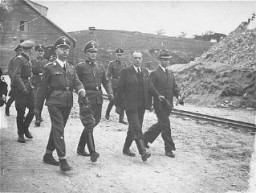You searched for: Liberation
<< Previous | Displaying results 1051-1075 of 1270 for "Liberation" | Next >>
-
Sam Spiegel reflects on survival during the Holocaust
Oral HistoryIn 1942, Sam was forced into a ghetto in his hometown and assigned to work in a munitions factory. In 1944 he was transported to Auschwitz and then forced to work in a train factory. He survived eight days on a death march after the evacuation of Auschwitz by the Nazis. He was liberated by Soviet units in January 1945. He lived in a displaced persons camp in Germany where worked for the United Nations Relief and Rehabilitation Administration. In 1947, he immigrated to the United States.
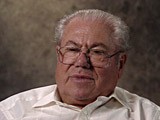
-
Hana Mueller Bruml recalls the occupation of Prague
Oral HistoryIn 1942, Hana was confined with other Jews to the Theresienstadt ghetto, where she worked as a nurse. There, amid epidemics and poverty, residents held operas, debates, and poetry readings. In 1944, she was deported to Auschwitz. After a month there, she was sent to Sackisch, a Gross-Rosen subcamp, where she made airplane parts at forced labor. She was liberated in May 1945.
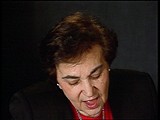
-
Sarah (Sheila) Peretz Etons describes her experiences as a child in hiding
Oral HistoryGermany invaded Poland on September 1, 1939. After the German occupation, Sarah (then just three years old) and her mother were forced into a ghetto. One day, a Polish Catholic policeman warned them that the ghetto was about to be liquidated. He sheltered Sarah and her mother first in his house, then in a potato storage bunker, and then in a chicken coop on his property. Sarah hid there for more than two years, until the area was liberated by Soviet forces. After the war, Sarah emigrated from…

-
Martin Spett describes a massacre of Tarnow Jews
Oral HistoryThe Germans occupied Tarnow in 1939. In 1940 Martin and his family were forced out of their apartment. During the first massacre of Jews, Martin hid in an attic. The family hid during two more roundups. In May 1943 they were registered, allegedly to be exchanged for German prisoners of war, because Martin's mother was born in the United States. They were taken by train to Krakow and then to the Bergen-Belsen concentration camp. Martin was liberated in 1945 and he moved to the United States in 1947.
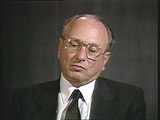
-
Abraham Bomba describes gassing operations at Treblinka
Oral HistoryDescribes gassing operations at Treblinka
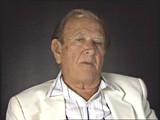
-
Franz Wohlfahrt describes the trial and sentencing of his father
Oral HistoryFranz and his family were Jehovah's Witnesses. Germany annexed Austria in 1938. After World War II began, Franz's father was executed because, as a Witness, he opposed war. In 1940, Franz refused to participate in military training and would not salute the Nazi flag. He was imprisoned, interrogated by the Gestapo (German Secret State Police) in Graz, and sentenced to five years of hard labor in a camp in Germany. Franz was liberated by US forces in 1945.
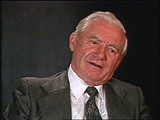
-
Franz Wohlfahrt describes imprisonment in Graz
Oral HistoryFranz and his family were Jehovah's Witnesses. Germany annexed Austria in 1938. After World War II began, Franz's father was executed because, as a Witness, he opposed war. In 1940, Franz refused to participate in military training and would not salute the Nazi flag. He was imprisoned, interrogated by the Gestapo (German Secret State Police) in Graz, and sentenced to five years of hard labor in a camp in Germany. Franz was liberated by US forces in 1945.
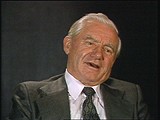
-
Abraham Bomba describes cutting women's hair before they were gassed in Treblinka
Oral HistoryAbraham was raised in Czestochowa, Poland, and became a barber. He and his family were deported to the Treblinka killing center from the Czestochowa ghetto in 1942. At Treblinka, Abraham was selected for forced labor. He was forced to cut women's hair before they were gassed, and he sorted clothing from arriving transports. Abraham escaped from the camp in 1943 and made his way back to Czestochowa. He worked in a labor camp from June 1943 until liberation by Soviet troops in 1945.
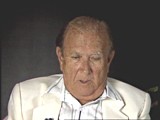
-
Lilly Appelbaum Malnik describes death march from Auschwitz to Bergen-Belsen
Oral HistoryGermany invaded Belgium in May 1940. After the Germans seized her mother, sister, and brother, Lilly went into hiding. With the help of friends and family, Lilly hid her Jewish identity for two years. But, in 1944, Lilly was denounced by some Belgians and deported to Auschwitz-Birkenau via the Mechelen camp. After a death march from Auschwitz, Lilly was liberated at Bergen-Belsen by British forces.
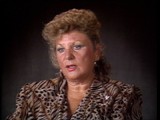
-
Lily Mazur Margules describes death march from a labor camp near Stutthof
Oral HistoryLily was forced into a ghetto after the Germans occupied Vilna in 1941. She was forced to work until the liquidation of the ghetto in 1943 when she was deported to the Kaiserwald camp near Riga, Latvia. From there she was sent to work in the Duenawerke labor camp. She was deported by ship across the Baltic Sea to the Stutthof camp and was taken to a nearby labor camp. Lily was liberated during a death march which ended in the town of Krumau, East Prussia, in 1945.
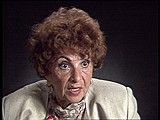
-
Leon Bass describes his experience as a Black soldier
Oral HistoryLeon Bass was born in Philadelphia, PA in 1925. He joined the US Army in 1943 and served as a member of the all-Black 183rd Engineer Combat Battalion attached to General Patton's Third Army. Leon's unit was involved in the Battle of the Bulge as well as the liberation of Buchenwald. After the war, Leon went on to receive his doctorate, teach, and speak about the Holocaust and racism. In this interview, Leon describes the his frustration with the discord between the United State's condemnation of Nazi…
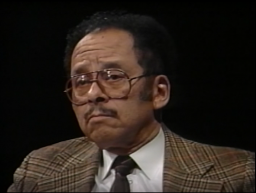
-
Leon Bass describes his wartime experiences
Oral HistoryLeon Bass was born in Philadelphia, PA in 1925. He joined the US Army in 1943 and served as a member of the all-Black 183rd Engineer Combat Battalion attached to General Patton's Third Army. Leon's unit was involved in the Battle of the Bulge as well as the liberation of Buchenwald. After the war, Leon went on to receive his doctorate, teach, and speak about the Holocaust and racism. In this interview, Leon describes his first experiences with the realities of war and death. He reflects upon his…
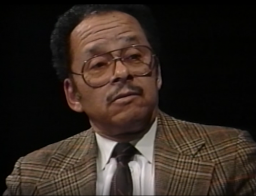
-
Leon Bass describes his feelings about joining the US Army
Oral HistoryLeon Bass was born in Philadelphia, PA in 1925. He joined the US Army in 1943 and served as a member of the all-Black 183rd Engineer Combat Battalion attached to General Patton's Third Army. Leon's unit was involved in the Battle of the Bulge as well as the liberation of Buchenwald. After the war, Leon went on to receive his doctorate, teach, and speak about the Holocaust and racism. In this interview, Leon describes the racism and segregation he faced in the United States during the 1940s and how it…
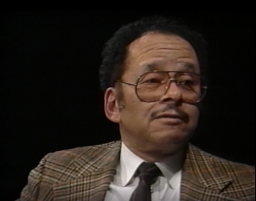
-
Leon Bass describes his knowledge of Nazi camps during and after World War II
Oral HistoryLeon Bass was born in Philadelphia, PA in 1925. He joined the US Army in 1943 and served as a member of the all-Black 183rd Engineer Combat Battalion attached to General Patton's Third Army. Leon's unit was involved in the Battle of the Bulge as well as the liberation of Buchenwald. After the war, Leon went on to receive his doctorate, teach, and speak about the Holocaust and racism. In this interview, Leon describes what he knew about Nazi concentration camps and the Holocaust during and after…
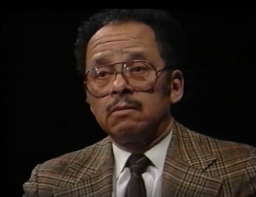
-
Sally Pitluk describes forced labor in Budy
Oral HistorySally Pitluk was born to Jewish parents in Płońsk, Poland in 1922. A few days after the German invasion of Poland in 1939, Płońsk was occupied. Sally and her family lived in a ghetto from 1940-1942. In October of 1942, Sally was transported to Auschwitz, where she was tattooed and moved into the subcamp Budy for forced labor. She stayed in the Auschwitz camp complex until the beginning of 1945 when she and other prisoners were death marched to several different camps. She was liberated in 1945 and…
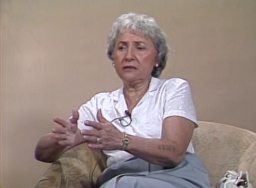
-
Sally Pitluk describes her removal from forced labor at Budy
Oral HistorySally Pitluk was born to Jewish parents in Płońsk, Poland in 1922. A few days after the German invasion of Poland in 1939, Płońsk was occupied. Sally and her family lived in a ghetto from 1940-1942. In October of 1942, Sally was transported to Auschwitz, where she was tattooed and moved into the subcamp Budy for forced labor. She stayed in the Auschwitz camp complex until the beginning of 1945 when she and other prisoners were death marched to several different camps. She was liberated in 1945 and…
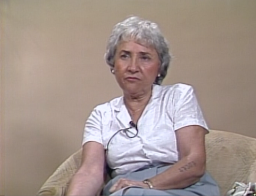
-
Hans Heimann describes internment in Italy
Oral HistoryThe Germans annexed Austria in March 1938. In 1939, Hans fled first to Hungary and then to Italy. He and his parents were interned in various towns. Hans's father became ill and died in 1940. In 1943, Hans and his mother were warned of German plans to deport Jews from Italy to Poland. They moved to smaller towns until liberation by the British in August 1943. Hans worked as an interpreter for the Allies until 1945, when he worked for the American Jewish Joint Distribution Committee and helped resettle…
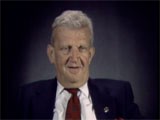
-
Guta Blass Weintraub describes Starachowice ghetto cultural life
Oral HistoryGuta and her family fled to Starachowice, Poland. There, the Germans ordered them and other Jews into a ghetto and put them to work in forced-labor factories. As an act of resistance at the Majowka camp, Guta attacked a Nazi guard preparing to shoot her and other prisoners at a mass grave. A bullet grazed her, but Guta pretended to be fatally wounded. Days later, Guta was deported to Auschwitz, then Ravensbrueck, where she was liberated. Her mother died only weeks short of freedom.
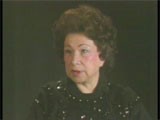
-
Fritzie Weiss Fritzshall describes restrictions placed on Jews in Klucarky
Oral HistoryFritzie's father immigrated to the United States, but by the time he could bring his family over, war had begun and Fritzie's mother feared attacks on transatlantic shipping. Fritzie, her mother, and two brothers were eventually sent to Auschwitz. Her mother and brothers died. Fritzie survived by pretending to be older than her age and thus a stronger worker. On a death march from Auschwitz, Fritzie ran into a forest, where she was later liberated.
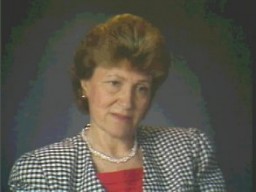
-
Auschwitz
Animated MapView an animated map showing key events in the history of the Auschwitz camp complex in German-occupied Poland.
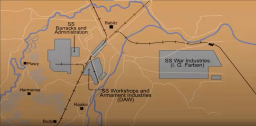
-
Immediate American Responses to the Nazi Book Burnings
ArticleThe Nazi book burnings of 1933 sparked responses from anti-Fascist organizations, Jewish groups, and writers in the United States. Learn more.
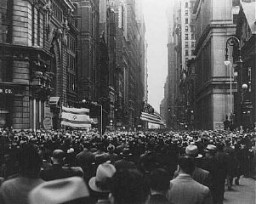
-
Freemasonry
ArticleAdolf Hitler repeated the pre-existing claim that Jews used Freemasonry to achieve their political ends. Learn more about the history of Freemasonry.
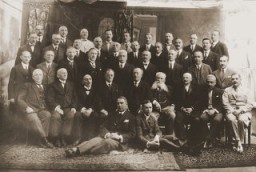
-
Elie Wiesel Timeline and World Events: From 1952
ArticleSurvivor Elie Wiesel devoted his life to educating the world about the Holocaust. Explore key events in the world and his life from 1952 until his death in 2016.
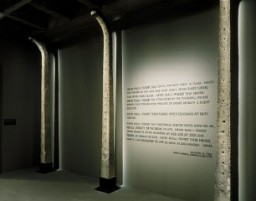
-
Third Reich
ArticleThe “Third Reich” is another name for Nazi Germany between 1933-1945. Learn more about life under Nazi rule before and during World War II.
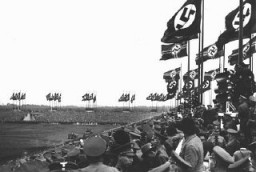
-
SS and the Camp System
ArticleIn 1933-1934, the SS seized control of the Nazi camp system. Learn more about the persecution, forced labor, and murder that occurred under SS camp rule.
